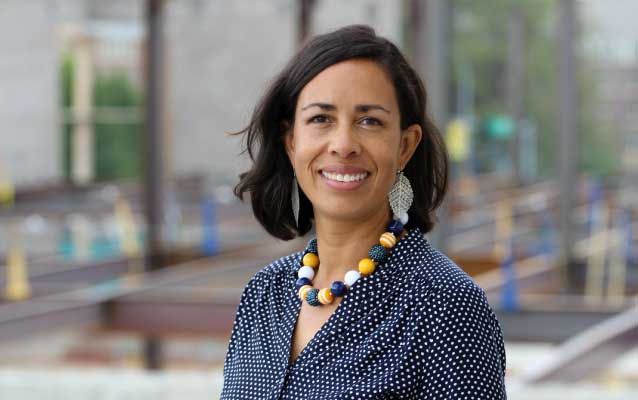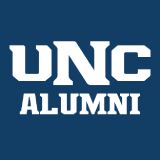Alumna’s new role gives direction to student retention and advising goals
Sitting down with Stephanie Torrez, looking past the Campus Commons construction site and to the corner of Ross Hall, you will see UNC’s emerging “collegiate feel.”
It is a term Torrez uses when referring to the look of campus. The future quad, the building architecture and the feeling the campus environment fosters.
For a university that is building a brand new student space, this feeling also needs to encompass the business strategies undertaken to retain and graduate more students.
The Business of Being a Student
As the university’s new Assistant Vice President for Student Success, Torrez is responsible for the design, implementation and evaluation of these strategies.
“It is hard to get people excited by what sounds like business.”
Yet the collegiate feel that students sign on for when they enroll at UNC requires a functional business operation. The systems and processes students use to register for classes, access financial aid and pay tuition bills. The ease with which they gain academic advice, utilize Center for Career Readiness and connect with co-curricular programs.
For many students, these business operations are opaque.
Ease of access and transparency are a challenge for a growing university of more than 12,000 students. Service and support staff are located across campus, in multiple buildings, often not working in unison to identify and remedy student challenges. Moreover, faculty who make up the bulk of UNC’s advising workforce tackle curricular and career questions alongside registration holds and administrative concerns.
Torrez is leading the team that seeks to remove these burdens. They are reviewing the barriers, outdated processes and redundancies that students and faculty face when addressing student business concerns.
“We are not creating a system, we have a system; but we are clearing it up. And we are building an infrastructure for our changes to stick.”
That infrastructure includes the new One-Stop+, which will be located in the Campus Commons. Within the One-Stop+, UNC will offer students a reimagined business support services center traditionally supported by three separate offices – the registrar, bursar and financial aid.
Other universities have begun migrating student business operations into shared facilities and spaces. UNC is going a step further; it plans to integrate services into a single team and in a single location.
“What we are doing differently is that we are integrating services, rather than a student having three conversations, he can have one.”
One-Stop+ staff will be trained to provide students assistance with all business support needs. Students who require additional and prolonged assistance will receive support through a case-management model. A single point of contact enables students to work through interconnected and even, unknown issues that impede degree progression. Additionally, One-Stop+ will emphasize and promote student utilization of co-curricular services like career advising, international education and community engagement.
“The Campus Commons One-Stop+ is a connector. Right now we have lack of coordination, duplication and gaps, but One-Stop+ will identify those across campus and address them.”
Torrez stresses the point that One-Stop+ is a strategy for accomplishing student success; it is not integrated student success on its own. When UNC established increased student persistence to graduation goals, One-Stop+ became the catalyst for changing how UNC would deliver services and empower students to focus on their academic success and completion.
Personal empowerment and accountability are important values for Torrez. She came to UNC with similar challenges faced by other limited income students, navigating the complexities of working her way through college while also trying to be a successful student. Today she encourages students to go after their goals. She wants them to believe in their potential for success, yet she understands that removal of unnecessary barriers ensures that more will.
Scaling Up to One-Stop+
Investment in the Campus Commons and One-Stop+ has not been without question. But Torrez prepared due diligence through peer research, bench marking and experience leading one of UNC’s highest performing programs, the Center for Human Enrichment (CHE).
CHE houses the federally sponsored TRiO program Student Support Services (SSS). SSS is one of three federally sponsored TRiO programs at UNC; the remaining TRiO programs McNair and Upward Bound are housed within other university offices.
SSS assists students from underrepresented backgrounds as they pursue and attain their college degree. The program is comprised of four integrated components: curriculum and instruction, academic advising, tutoring, and educational technology.
Torrez worked with CHE for 10 years, ultimately serving as director before taking on additional responsibility managing the university’s advisement and academic support offices.
Working first hand with TRiO students, as well as students at large, Torrez knows the improved student success outcomes that come with integrated services. According to Torrez, students who participate in CHE present higher retention and graduation rates than the campus as a whole.
“I asked the question, ‘If these types of wraparound services are good for our first generation, historically at-risk students on our campus, couldn’t they be better for all?’”
But achieving improved student outcomes on a university-wide scale requires working with advising staff and faculty, business offices and administrators at all levels of the university. So in her new role as assistant vice president, she is reviewing all aspects of student support services – staffing, policies and training.
“We are making smart and tactical moves toward clarifying roles on campus, clearing up function and purpose, and providing more systematic delivery of student success services.”
Working with Provost Robbyn Wacker, Torrez outlined a multi-year implementation plan that will incorporate One-Stop+ and other student success strategies. To date, she has conducted an analysis of One-Stop+ functions; is working with campus directors, faculty and staff to review and revise policies; hired a director and will soon begin identifying and training staff.
By the time the One-Stop+ opens in the 2018-2019 academic year, UNC will have a business operation ready to match and support the collegiate feel created by the new Campus Commons.
Pueblo, Colo. native, Stephanie Torrez enrolled in UNC as an undergraduate student in the early 1990s. She completed her degree in 1995. She has more than two decades of experience researching, evaluating and directing university student success initiatives, including supervision of six major retention departments at UNC. She holds a masters in educational leadership & policy studies and is currently completing a doctoral degree in organizational learning, performance and change through Colorado State University.
As UNC’s new Assistant Vice President for Student Success, Torrez leads the division of student success and is the university senior administrator responsible for establishing the campus-wide strategic direction for student support activities. Torrez is responsible for directing, coordinating and organizing student success efforts at UNC. The division of Student Success will promote academic success through campus-wide leadership, strategic focus, partnership and advocacy. The goal is to refine and cultivate a university community in ways that positively impact the student experience and ultimately lead to successful degree completion.



